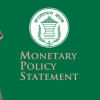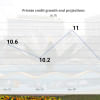Private credit growth target lowered amid low appetite

Bangladesh Bank (BB) has lowered the target for private sector credit growth in its latest monetary policy, citing a lack of appetite arising from political uncertainties.
Ahsan H Mansur, governor of the central bank, read out the summary of the Monetary Policy Statement (MPS) for the next six-month period at a press conference at the BB's headquarters yesterday.
The BB set the private sector credit growth target at 7.2 percent for the six months, down from a target of 9.8 percent set for the preceding six months, reflecting the contractionary nature of the monetary policy.
Private sector credit grew by only 6.4 percent in June, the lowest on record in more than two decades, according to BB data.
The MPS projected that private sector credit will remain at 8 percent till June next year, due to the contractionary nature of monetary policy aimed at containing persistently high inflation and low credit demand from non-bank financial corporations.
However, industry insiders said the lowering of the private sector credit growth target would have a detrimental effect on employment generation and GDP growth.
In a reaction, the Dhaka Chamber of Commerce and Industry (DCCI) expressed concern over Bangladesh Bank's continued contractionary monetary policy, saying it is undermining private investment and industrial activity.
But Bangladesh Bank Governor Ahsan H Mansur said if Bangladesh cannot ensure macroeconomic stability, then growth must be forgotten.
"There is no country in the world that achieves good growth without macro stability. So, macro stability is a precondition for stable growth," he said.
The central bank governor said political stability plays a major role in achieving good GDP growth, and in the current context of Bangladesh, there is indeed uncertainty.
"There is no way to deny that. And this cannot be covered by monetary policy," said Mansur.
According to the monetary policy statement, the public sector credit growth target was set at 20.4 percent for the six months till December this year.
In December last year, public sector credit growth hit 18.1 percent, owing to the government's low credit demand, as it has been selectively spending on priority projects as part of austerity measures.
Moreover, the government's budgetary target to borrow a total of Tk 104,000 crore from the banking system has also been duly considered in projecting the public sector credit growth limit, it added.
Md Ezazul Islam, executive director of the Monetary Policy Department of the central bank, presented a paper on the macroeconomic overview, outlook, and challenges for the first half of the fiscal year 2025-26 at the press conference.
He highlighted that the economy's major challenges include the persistence of high inflation, exchange rate pressure, tight liquidity in the banking sector, elevated non-performing loans, and the need to restore good governance in banks and non-bank financial institutions.
He also mentioned the prolonged Russia-Ukraine war, escalating geopolitics and geo-economics, conflict in the Middle East, and Trump's tariff hikes as other challenges.
The four deputy governors and other high officials of the central bank were present at the press conference.
While discussing sustainable growth, the BB governor said, "If we want sustainable growth, then we must ensure a comfortable position in our balance of payments."
"We also need to be in a stable position in terms of price stability. Our interest rate needs to be brought down. But how do we reduce it sustainably? Previously, what was done was a kind of declaration—setting it at 9 percent," he said.
He said Bangladesh lost macroeconomic stability, and inflation entered double digits due to the interest rate regime forcibly set during the previous government's tenure.
"We lost everything. So, doing anything artificially is not the right approach," he said.
FINANCIAL SECTOR REFORMS
The MPS said banking sector reform has become a top priority under the current interim government.
To steer these reforms, the BB has constituted three specialised task forces, including the Banking Sector Reforms Task Force (BSR-TF), it said.
The BSR-TF is leading efforts to strengthen the regulatory framework, improve asset quality, and establish a structured mechanism for effective bank resolution, it added.
Regarding reforms in the banking sector and bank merger initiatives, the central bank governor said there is no issue of depositors not getting their money back.
"Depositors are completely safe. They will get back every single taka they have deposited. The current situation of those banks will significantly improve," said Mansur.
"This is because a substantial amount of capital will be injected into them. At the same time, this is not a superficial remedy — it is more like a major surgical operation," he said.
Through this process, the capital base of the banks will be strengthened and their governance will be improved, he added.
The monetary policy statement said the surge in non-performing loans (NPLs) has led to growing concerns for the banking sector.
"This sharp increase in NPLs is primarily attributed to the implementation of stricter loan classification guidelines, which took effect on 30 September 2024," it said.
"Moreover, the introduction of comprehensive loan classification and provisioning guidelines aligned with international best practices came into force on 1 April 2025," it added.

 For all latest news, follow The Daily Star's Google News channel.
For all latest news, follow The Daily Star's Google News channel. 








Comments